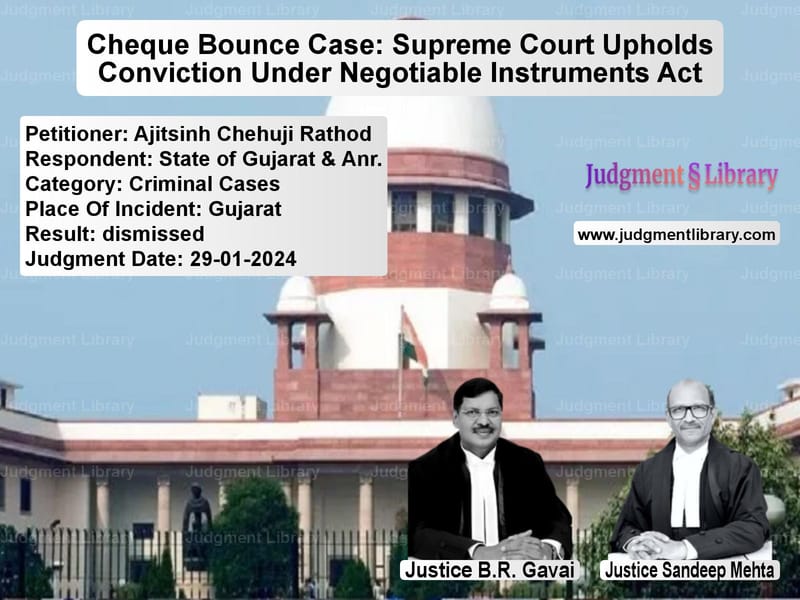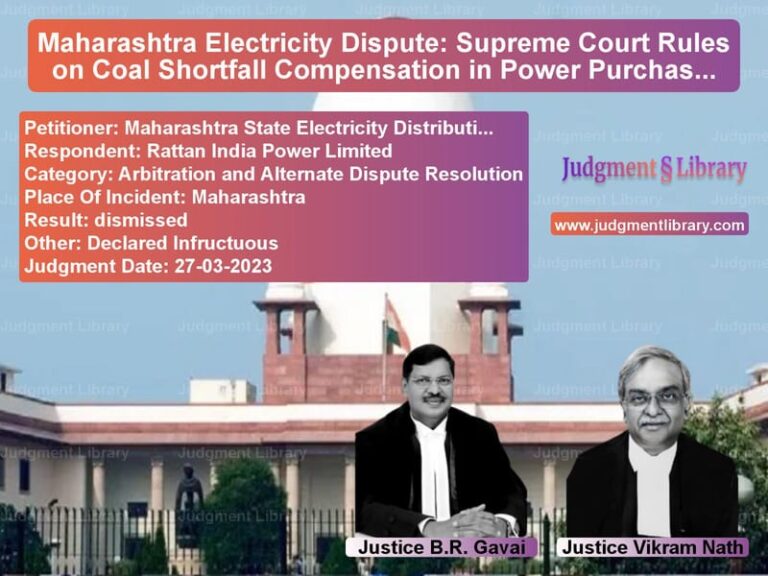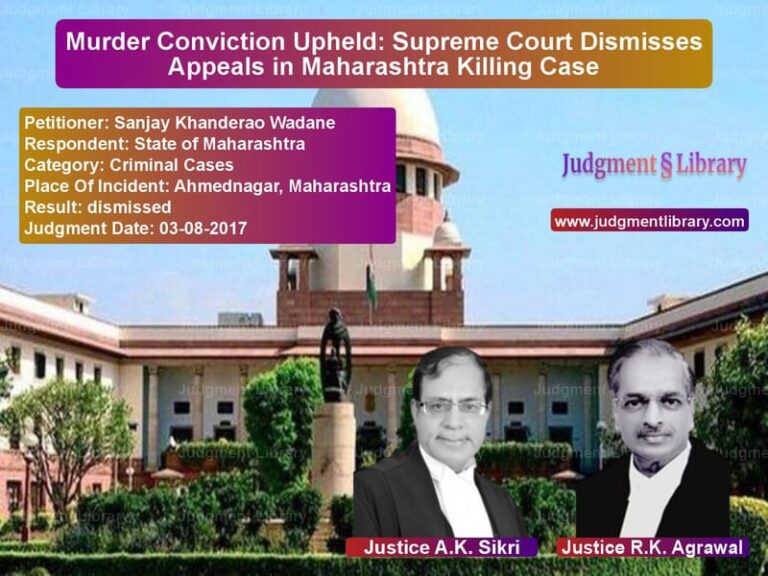Cheque Bounce Case: Supreme Court Upholds Conviction Under Negotiable Instruments Act
The Supreme Court of India, in its judgment dated 29 January 2024, addressed an appeal regarding a conviction under Section 138 of the Negotiable Instruments Act, 1881 (NI Act). The case, Ajitsinh Chehuji Rathod vs. State of Gujarat & Anr., revolved around the dishonor of a cheque amounting to Rs. 10 lakh due to insufficient funds and a dormant account.
The Court dismissed the appeal, reaffirming that the burden of rebutting the presumption of legitimacy in a cheque bounce case lies on the accused. It ruled that the appellant failed to establish that his signature was forged or that he did not receive the statutory notice under Section 138 of the NI Act.
Background of the Case
The case originated when the complainant, Mahadevsinh Chandrasinh Champavat, presented a cheque issued by the appellant, Ajitsinh Chehuji Rathod, which was dishonored with the return memo citing “funds insufficient and account dormant.”
The complainant then issued a statutory notice under Section 138 of the NI Act, which was allegedly not received by the appellant. Subsequently, a complaint was filed before the trial court, leading to the appellant’s conviction.
Key Legal Issues
- Whether the appellant’s signatures on the cheque were forged.
- Whether failure to receive the statutory notice could nullify the prosecution under Section 138 NI Act.
- Whether the appellant was entitled to introduce additional evidence at the appellate stage under Section 391 CrPC.
Petitioner’s Arguments (Ajitsinh Chehuji Rathod)
The appellant made the following claims in his defense:
- He had not signed the cheque in question, and his signatures had been forged.
- He had filed an application before the trial court to send the cheque for handwriting analysis, which was rejected.
- He did not receive the statutory notice under Section 138 NI Act, as the postal records did not confirm its delivery.
- The appellate court should allow additional evidence under Section 391 of the Code of Criminal Procedure (CrPC) to prove the alleged forgery.
Respondent’s Arguments (State of Gujarat & Complainant)
The prosecution and complainant opposed the appeal, stating:
- The cheque was dishonored due to insufficient funds and a dormant account, proving that the appellant issued it knowingly.
- The appellant had ample opportunity to challenge the authenticity of the cheque but failed to do so at the trial stage.
- The return memo from the bank did not cite signature mismatch, indicating that the appellant’s claim of forgery was an afterthought.
- As per Section 118 and Section 139 of the NI Act, there is a presumption that every negotiable instrument is drawn for a valid consideration, and the burden lies on the accused to rebut this presumption.
Supreme Court’s Judgment
The Supreme Court, comprising Justice B.R. Gavai and Justice Sandeep Mehta, dismissed the appeal, affirming the conviction.
Key observations:
- The burden of proof was on the appellant to establish that his signature was forged, which he failed to do.
- The cheque return memo explicitly mentioned “funds insufficient and account dormant”, not “signature mismatch.”
- Section 118(e) of the NI Act creates a presumption that endorsements appearing on a negotiable instrument were made in the order they appear.
- The trial court had rightly rejected the appellant’s request for handwriting analysis, as it was a delaying tactic.
- Since the appellant did not challenge the rejection of his application for handwriting analysis earlier, he could not seek to introduce fresh evidence under Section 391 CrPC.
Legal Provisions Considered
The Court referred to key provisions of the Negotiable Instruments Act, 1881:
- Section 118: Presumption regarding negotiable instruments, including consideration, date, and order of endorsement.
- Section 139: Presumption in favor of the holder of the cheque that it was issued for consideration.
- Section 138: Criminal liability for dishonoring a cheque due to insufficient funds.
Additionally, the Court examined Section 391 CrPC, which allows an appellate court to admit additional evidence only in exceptional circumstances where it is crucial to prevent a miscarriage of justice.
Impact of the Judgment
This ruling has significant implications for cheque bounce cases:
- Strengthens statutory presumption: Ensures that accused persons cannot evade liability without substantial evidence.
- Discourages delaying tactics: Rejects attempts to introduce new evidence at the appellate stage without valid reasons.
- Protects negotiability of cheques: Reinforces the reliability of cheques as financial instruments.
Conclusion
The Supreme Court’s judgment in Ajitsinh Chehuji Rathod vs. State of Gujarat & Anr. reaffirms that mere claims of forgery cannot override statutory presumptions under the NI Act. The ruling ensures that cheque bounce cases are resolved efficiently, preventing undue delays and misuse of legal provisions by accused individuals.
Read also: https://judgmentlibrary.com/supreme-court-cancels-default-bail-in-dhfl-bank-fraud-case/
Petitioner Name: Ajitsinh Chehuji Rathod.Respondent Name: State of Gujarat & Anr..Judgment By: Justice B.R. Gavai, Justice Sandeep Mehta.Place Of Incident: Gujarat.Judgment Date: 29-01-2024.
Don’t miss out on the full details! Download the complete judgment in PDF format below and gain valuable insights instantly!
Download Judgment: ajitsinh-chehuji-rat-vs-state-of-gujarat-&-a-supreme-court-of-india-judgment-dated-29-01-2024.pdf
Directly Download Judgment: Directly download this Judgment
See all petitions in Cheque Dishonour Cases
See all petitions in Fraud and Forgery
See all petitions in Bail and Anticipatory Bail
See all petitions in Legal Malpractice
See all petitions in Contract Disputes
See all petitions in Judgment by B R Gavai
See all petitions in Judgment by Sandeep Mehta
See all petitions in dismissed
See all petitions in supreme court of India judgments January 2024
See all petitions in 2024 judgments
See all posts in Criminal Cases Category
See all allowed petitions in Criminal Cases Category
See all Dismissed petitions in Criminal Cases Category
See all partially allowed petitions in Criminal Cases Category







